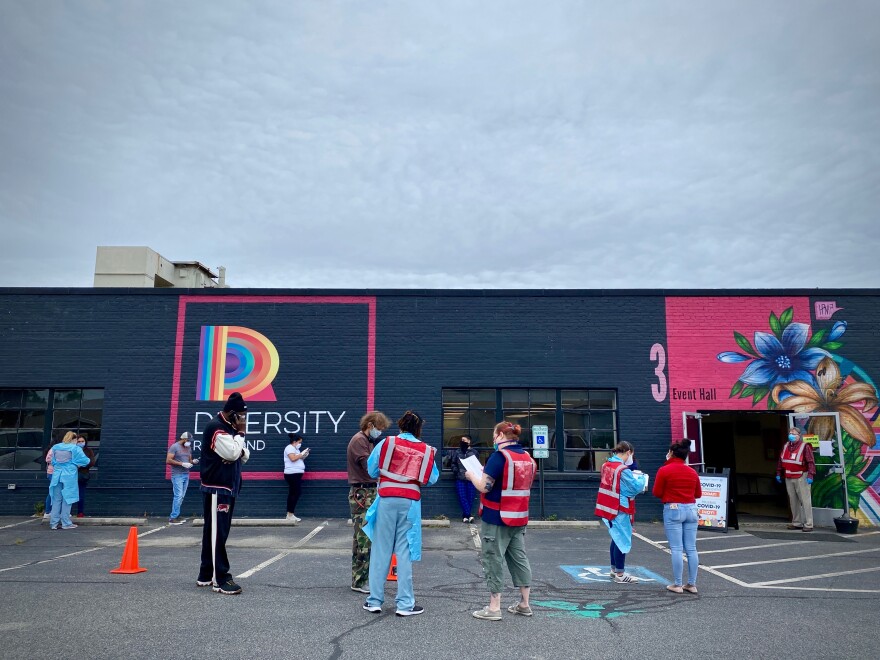Experts agree widespread testing for coronavirus is key to prevent future surges of the virus. In Virginia an effort is underway to make sure testing is reaching all parts of the state, including communities that may be harder hit by the virus.
Richmond City and Henrico County Health Director Danny Avula stands inside Diversity Thrift, a store and community center in the city. They’re hosting their tenth community testing event here today.
The large open space is staffedwith health department employees and volunteers from the Medical Reserve Corps. One of the volunteers, wearing a gown and speaking through a full face mask, shows how the testing procedure works.
Outside, a line of people waiting to get tested snakes around the building.
It’s free and Avula says they’re not turning people away. That’s possible because they have plenty of supplies.
“The state lab received a huge shipment, I think 40,000 test swabs, they’re expecting that volume of delivery pretty much every week I think over the next month,” he explains.
So far they’ve been able to test hundreds of people. Officials are targeting the region’s African-American and Latino communities, data shows they’re at higher risk. But Avula says that early on there was some resistance.
“Particularly by the black community saying we don’t want people to come in and test in our community, why are we being targeted, we’re not anybody’s guinea pigs,” Avula recalls, adding that he understands that response, given the horrific way healthcare and government systems have treated black communities in the past.
But he and his staff have persisted through door to door canvassing, partnering with churches, and virtual town halls.
“We’ve had to continue to stay the course knowing that testing is a need,” Avula says. “That these communities are going to be affected more significantly by COVID-19 and so we’ve just stayed at it.”
Officials at the state level are trying to help. They’ve put together a Health Equity Task Force that provides training, education, and resources. Chief Diversity Officer Janice Underwood says, so far, they’ve worked with Richmond, Chesapeake and Harrisonburg.
“The Health Equity Work Group has provided each locality with 20,000 masks and 20,000 bottles of hand sanitizer,” Underwood says. “That has been an incredible partnership and it has been one that has shown to be well received in those localities and there are plans to expand that.”
As of last week they were talking to Petersburg and Roanoke about providing additional support. But health directors around the state say supplies are no longer the most limited resource. Now, it’s people.
Denise Bonds is director of the Thomas Jefferson health district, that’s Charlottesville and the surrounding counties. She’s had to redirect staff from other jobs in order to hold weekly testing events and do the necessary follow-up.
“We took some of our environmental health staff since restaurants were closed or only doing take out, we were able to take some of those food inspectors and train them to do case investigations,” she says. But now with the economy starting to reopen, Bonds needs those employees back in their day jobs.
That’s when she got news of an anonymous donation. She won’t say how much money it was, but it’s enough that she can hire a dedicated testing team and run three community testing events a week.
“If we see the need for it, and the community wants that, we’re willing to try and test five days a week,” Bonds says. “That’s a stretch, because again of all of the work that goes on ahead and after the fact.”
But in other parts of the state, like Roanoke, anonymous donations haven’t saved the day and there simply aren’t enough trained staff for regular community testing.
Molly O’Dell, director of communicable disease prevention for the Roanoke City and Alleghany Health Districts, says that given those limited resources, she also says they still need swabs, they’re prioritizing targeted testing in places where they know there are outbreaks.
“Doing widespread community testing, that would be the next level of priority, and we’re certainly not there yet,” O’Dell told reporters this week.
Once officials in Roanoke do get there they may face another problem.
Health directors in Richmond and Charlottesville are now dealing with how to support someone who tests positive but doesn’t have healthcare, access to housing where they can isolate from family, or paid sick leave.
This report, provided by Virginia Public Radio, was made possible with support from the Virginia Education Association.


